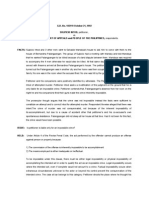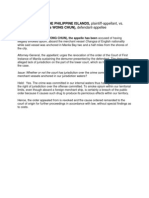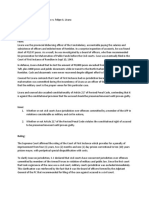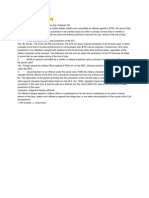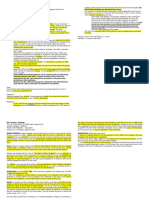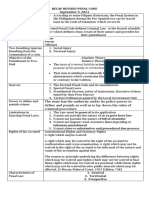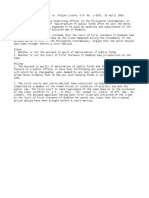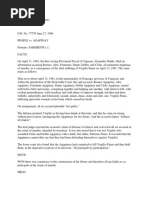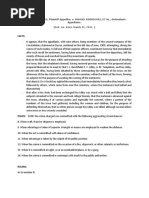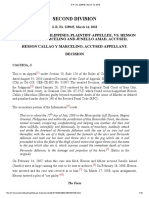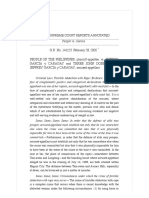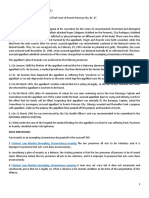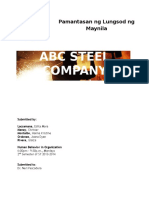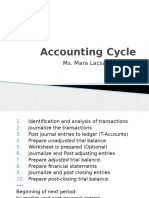US Vs Ah Sing
US Vs Ah Sing
Uploaded by
Mara LacsamanaCopyright:
Available Formats
US Vs Ah Sing
US Vs Ah Sing
Uploaded by
Mara LacsamanaOriginal Description:
Original Title
Copyright
Available Formats
Share this document
Did you find this document useful?
Is this content inappropriate?
Copyright:
Available Formats
US Vs Ah Sing
US Vs Ah Sing
Uploaded by
Mara LacsamanaCopyright:
Available Formats
G.R. No.
L-13005 | October 10, 1917
THE UNITED STATES, plaintiff-appellee, vs. AH SING, defendant-appellant.
Objective: Appeal from a judgment of the Court of First Instance of Cebu finding the
defendant guilty of a violation of section 4 of Act No. 2381 (the Opium Law)
Facts:
The defendant is a subject of China employed as a fireman on the steamship
Shun Chang. The Shun Chang is a foreign steamer which arrived at the port of
Cebu on April 25, 1917, after a voyage direct from the port of Saigon.
The defendant bought eight cans of opium in Saigon, brought them on board
the steamship, and had them in his possession during the trip from Saigon to
Cebu. When the steamer anchored in the port of Cebu on April 25, 1917, the
authorities on making a search found the eight cans of opium hidden in the ashes
below the boiler of the steamer's engine.
The defendant confessed that he was the owner of this opium, and that he
had purchased it in Saigon. He did not say that it was his intention to import the
prohibited drug into the Philippine Islands.
No other evidence direct or indirect, to show that the intention of the accused
was to import illegally this opium into the Philippine Islands, was introduced.
Issue: Whether or not the crime of illegal importation of opium into the Philippine
Islands has been proven
Ruling: Yes, the crime of illegal importation of opium is proven. There was illegal
importation of opium from a foreign country into the Philippine Islands.
Rationale:
Section 4 of Act No. 2381 begins, "Any person who shall unlawfully import or
bring any prohibited drug into the Philippine Islands." "Import" and "bring" are
synonymous terms. The Federal Courts of the United States have held that the
mere act of going into a port, without breaking bulk, is prima facie evidence of
importation.
As applied to the Opium Law, [the Court] expressly holds that any person
unlawfully imports or brings any prohibited drug into the Philippine Islands, when
the prohibited drug is found under this person's control on a vessel which has
come direct from a foreign country and is within the jurisdictional limits of the
Philippine Islands.
The Court accordingly finds that there was illegal importation of opium from a
foreign country into the Philippine Islands. To anticipate any possible
misunderstanding, let it be said that these statements do not relate to foreign
vessels in transit, a situation not present.
You might also like
- NEGO Finals ExamDocument2 pagesNEGO Finals ExamMara LacsamanaNo ratings yet
- US Vs AH SINGDocument1 pageUS Vs AH SINGJoyleen HebronNo ratings yet
- Criminal Law 1 - DigestsDocument29 pagesCriminal Law 1 - DigestsNafiesa Imlani100% (2)
- US v. Ah Sing - DigestDocument1 pageUS v. Ah Sing - DigestJilliane Oria100% (3)
- Ateneo CrimLaw 1Document124 pagesAteneo CrimLaw 1jae eNo ratings yet
- G.R. No. 80762 People vs. Gonzales, 183 SCRA 309 (1990)Document9 pagesG.R. No. 80762 People vs. Gonzales, 183 SCRA 309 (1990)Shereen Alobinay100% (1)
- De Joya V Jail Warden of BatangasDocument2 pagesDe Joya V Jail Warden of Batangasmikael_shmikael100% (1)
- Crim Law Case Digest IDocument44 pagesCrim Law Case Digest IDjøn AmocNo ratings yet
- 2 US v. Go Chico (1909)Document1 page2 US v. Go Chico (1909)ABbo HernandezNo ratings yet
- 12 Vargas Vs KilclineDocument4 pages12 Vargas Vs KilclinemilotNo ratings yet
- Intod Vs CADocument2 pagesIntod Vs CARomeo Glenn Bongulto100% (1)
- G.R. No. 109250 Lim vs. People, 340 SCRA 497 (2000)Document10 pagesG.R. No. 109250 Lim vs. People, 340 SCRA 497 (2000)Shereen AlobinayNo ratings yet
- 40 - Us. V. Apostol, 14 Phil 92 (1909)Document2 pages40 - Us. V. Apostol, 14 Phil 92 (1909)Digesting FactsNo ratings yet
- Lito Corpuz Vs People of The PhilippinesDocument2 pagesLito Corpuz Vs People of The PhilippinesTrish Marcos100% (1)
- Criminal Law Cases 1Document56 pagesCriminal Law Cases 1Charls BagunuNo ratings yet
- People Vs Wong Cheng DigestDocument1 pagePeople Vs Wong Cheng DigestjienlouNo ratings yet
- G.R. No. L-30061Document3 pagesG.R. No. L-30061strgrlNo ratings yet
- Title: People of The Philippines vs. Felipe A. LivaraDocument2 pagesTitle: People of The Philippines vs. Felipe A. LivaraHan ONo ratings yet
- U.S. Vs SweetDocument10 pagesU.S. Vs SweetLeah Perreras TerciasNo ratings yet
- Persons DigestDocument20 pagesPersons DigestAJ RamirezNo ratings yet
- 018united States Vs Sweet, 1 Phil 18, G.R. No. 448, September 20, 1901Document4 pages018united States Vs Sweet, 1 Phil 18, G.R. No. 448, September 20, 1901Estrella DolawNo ratings yet
- Crim Digests COMPILATIONDocument83 pagesCrim Digests COMPILATIONelizbalderasNo ratings yet
- Crim CasesDocument48 pagesCrim CasesAndrea ANo ratings yet
- Revised Penal Code RecapDocument6 pagesRevised Penal Code RecapPaulaNo ratings yet
- Serrano vs. PeopleDocument9 pagesSerrano vs. PeopleJeanne CalalinNo ratings yet
- People vs. ButiongDocument11 pagesPeople vs. ButiongGlaize Shaye Cuaresma SantosNo ratings yet
- V2 Crim Cases Art 7 - 10Document15 pagesV2 Crim Cases Art 7 - 10sleepyhead1412100% (1)
- 132 SCRA 523 People Vs VeridianoDocument3 pages132 SCRA 523 People Vs VeridianoPanda Cat0% (1)
- Crim 1 DigestsDocument25 pagesCrim 1 DigestsChanyeol ParkNo ratings yet
- People of The Philippines vs. Felipe Livara G.R. No. L-6201 20 April 1954..people of The Philippines vs. Felipe LivaraDocument1 pagePeople of The Philippines vs. Felipe Livara G.R. No. L-6201 20 April 1954..people of The Philippines vs. Felipe LivaraR GildoNo ratings yet
- 1 3 Case DigestDocument13 pages1 3 Case DigestChienette MedranoNo ratings yet
- Digest PeopleVsSilvestreDocument2 pagesDigest PeopleVsSilvestreJappy AlonNo ratings yet
- US vs. Diaz CondeDocument1 pageUS vs. Diaz Condedazzingbangaw100% (1)
- G.R. No. 4963 (US V Go Chico)Document5 pagesG.R. No. 4963 (US V Go Chico)KhiarraNo ratings yet
- People V Gona Phil 54 Phil 605Document1 pagePeople V Gona Phil 54 Phil 605Carly GraceNo ratings yet
- US v. PabloDocument1 pageUS v. PabloRidzanna AbdulgafurNo ratings yet
- PP vs. Agapinay (#47)Document2 pagesPP vs. Agapinay (#47)justine bayosNo ratings yet
- People vs. RodriguezDocument3 pagesPeople vs. RodriguezPrieti HoomanNo ratings yet
- People v. Callao and AmadDocument18 pagesPeople v. Callao and AmadNeil SubacNo ratings yet
- 9 - US v. Sweet, 1 Phil. 18 (1901)Document2 pages9 - US v. Sweet, 1 Phil. 18 (1901)Digesting FactsNo ratings yet
- 2 People Vs Que Po LayDocument2 pages2 People Vs Que Po LayRexNo ratings yet
- Victoriano Yamzon, For Appellant. Attorney-General Paredes, For AppelleeDocument1 pageVictoriano Yamzon, For Appellant. Attorney-General Paredes, For AppelleeBai Amira HadjiesmaelNo ratings yet
- People v. Garcia (CRIM) PDFDocument17 pagesPeople v. Garcia (CRIM) PDFdelayinggratificationNo ratings yet
- US v. Pablo, 35 Phil 94 (1916)Document10 pagesUS v. Pablo, 35 Phil 94 (1916)Esz ChuaNo ratings yet
- US Vs Go ChicoDocument1 pageUS Vs Go ChicoJolo Coronel100% (1)
- Valenzuela V PeopleDocument2 pagesValenzuela V PeopleDanielleNo ratings yet
- People vs. Gonzales G.R. No. 80762Document12 pagesPeople vs. Gonzales G.R. No. 80762Gendale Am-isNo ratings yet
- Us Vs Abad Santos 36, Phil 243Document2 pagesUs Vs Abad Santos 36, Phil 243G-one Paisones100% (1)
- People vs. ValledorDocument2 pagesPeople vs. ValledorAlmer TinapayNo ratings yet
- US vs. FowlerDocument1 pageUS vs. FowleralingjomarNo ratings yet
- CRIMLAW1 Valenzuela Case DigestDocument1 pageCRIMLAW1 Valenzuela Case DigestMichyLG100% (2)
- US V. BULL Case DigestDocument2 pagesUS V. BULL Case DigestRosabella Music100% (2)
- Case Title: US Vs Bull, 15 Phil 7Document1 pageCase Title: US Vs Bull, 15 Phil 7JOEL MARZAN100% (1)
- People v. GonzalesDocument1 pagePeople v. GonzalesFrancis PunoNo ratings yet
- Aristotel Valenzuela y Natividad Vs PeopleDocument2 pagesAristotel Valenzuela y Natividad Vs PeopleZepht BadillaNo ratings yet
- U.S. V Sweet Case Digest (G.R. No.448)Document1 pageU.S. V Sweet Case Digest (G.R. No.448)Maeben AngelesNo ratings yet
- US v. Bull 15 Phil 7Document2 pagesUS v. Bull 15 Phil 7eubelrom100% (1)
- G.R. No. 97471 People vs. PunoDocument7 pagesG.R. No. 97471 People vs. PunoMichelle Montenegro - AraujoNo ratings yet
- Tapucar vs. TapucarDocument5 pagesTapucar vs. Tapucarvherny_corderoNo ratings yet
- 34 US V Ah SingDocument2 pages34 US V Ah SingKEDNo ratings yet
- US V Ah Sing DigestDocument3 pagesUS V Ah Sing DigestSantiago Andres LaigoNo ratings yet
- RHEA Affidavit ComplaintDocument3 pagesRHEA Affidavit ComplaintMara Lacsamana0% (1)
- ParCor Corpo EQ Set ADocument3 pagesParCor Corpo EQ Set AMara LacsamanaNo ratings yet
- Cash Flow Analysis and Financial PlanningDocument26 pagesCash Flow Analysis and Financial PlanningMara LacsamanaNo ratings yet
- 01 Memory Aid Persons and Family RelationsDocument64 pages01 Memory Aid Persons and Family RelationsMara Lacsamana100% (5)
- Jebsen Maritime Vs GavinaDocument3 pagesJebsen Maritime Vs GavinaMara LacsamanaNo ratings yet
- Principles of Marketing Report On Social Criticism in MarketingDocument29 pagesPrinciples of Marketing Report On Social Criticism in MarketingMara LacsamanaNo ratings yet
- Financial Statement Analysis, Balance Sheet, Income Statement, Retained Earnings StatementDocument51 pagesFinancial Statement Analysis, Balance Sheet, Income Statement, Retained Earnings StatementMara LacsamanaNo ratings yet
- FinMan Report On FS Analysis RATIODocument31 pagesFinMan Report On FS Analysis RATIOMara LacsamanaNo ratings yet
- HBO Case Analysis - ABC Steel CompanyDocument6 pagesHBO Case Analysis - ABC Steel CompanyMara Lacsamana100% (1)
- HBO Foundations of Individual BehaviorDocument5 pagesHBO Foundations of Individual BehaviorMara LacsamanaNo ratings yet
- Financial Statement Analysis, Balance Sheet, Income Statement, Retained Earnings StatementDocument57 pagesFinancial Statement Analysis, Balance Sheet, Income Statement, Retained Earnings StatementMara LacsamanaNo ratings yet
- Accounting CycleDocument15 pagesAccounting CycleMara LacsamanaNo ratings yet










